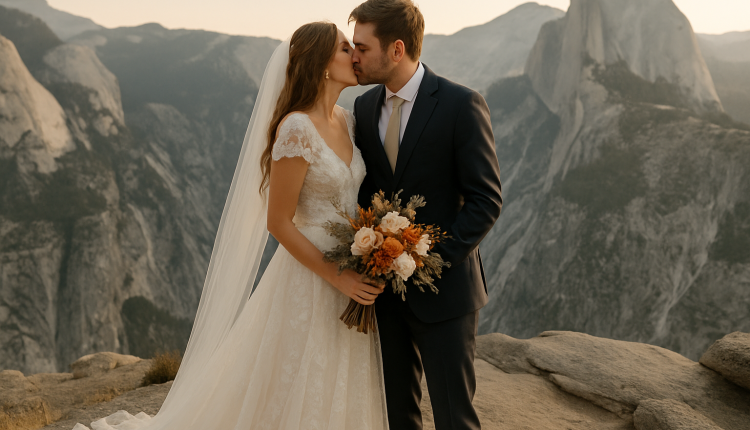ChatGPT сказал:
Weddings have long been defined by tradition—grand venues, lengthy guest lists, formal seating charts, and weeks or even months of stressful planning. But in recent years, a quiet revolution has been reshaping the wedding landscape: the rise of modern elopements.
Far removed from the stereotype of a spontaneous courthouse ceremony or a secret dash to Las Vegas, today’s elopements are intimate, intentional, and often breathtakingly beautiful. For couples looking to strip away the expectations and pressures of conventional weddings, elopement offers an authentic, personalized alternative that places the focus back on what truly matters—the commitment between two people.
What Is a Modern Elopement?
In the past, to elope often meant to marry in secrecy or without parental consent. Today, the meaning has evolved. A modern elopement typically involves a planned, often picturesque ceremony attended only by the couple or by a very small group of close loved ones. The emphasis is on intimacy, experience, and emotion, rather than spectacle and obligation.
Modern elopements can take many forms: a sunrise ceremony on a mountaintop, a barefoot exchange of vows on a secluded beach, or a stylish city hall wedding followed by a private dinner. The location and format are as flexible and unique as the couples themselves.
Why Couples Are Choosing to Elope
Several cultural shifts have contributed to the rise of modern elopements. Financial considerations are a major factor. With traditional weddings often costing tens of thousands of dollars, many couples are reevaluating what they truly want to invest in. An elopement, while not necessarily cheap, offers better control over costs without sacrificing style or meaning.
There’s also a growing desire for authenticity. Couples want their wedding day to reflect their personalities, values, and relationship—not to perform for hundreds of guests or meet external expectations. Eloping allows couples to create a ceremony that feels private, emotional, and deeply personal.
Additionally, the pandemic forced many couples to downsize or rethink their original plans. This shift helped normalize smaller celebrations and opened the door for more creative, flexible alternatives.
Planning a Memorable Elopement
Just because elopements are smaller doesn’t mean they require less thought or care. In fact, many couples invest even more attention into the details of their elopement, knowing that each decision contributes to a truly meaningful experience.
Location is often the centerpiece of an elopement. Popular destinations include national parks, remote coastlines, historic landmarks, and scenic international locales. Permits and legal considerations vary widely by country and state, so doing thorough research is essential.
Photography and videography are more important than ever in elopements. Since the couple may be the only ones present, professional documentation helps capture the moment for friends and family who aren’t in attendance. Many photographers now specialize in adventure or destination elopements and can even assist with planning.
Outfits can range from traditional gowns and suits to more casual or themed attire, depending on the setting. Without the pressure of a large audience, couples often feel more freedom to dress in a way that truly reflects their style.
Vows and ceremonies become incredibly personal. With no formal audience, couples often write their own vows, speak from the heart, and structure the ceremony in a way that resonates with them—whether it includes cultural traditions, spiritual elements, or simple, heartfelt words.
After-ceremony celebrations may include a private picnic, a luxury dinner, or even a multi-day honeymoon adventure. Some couples also choose to host a casual reception with friends and family later, blending the intimacy of an elopement with the joy of celebrating together.
Legal Considerations
Legalizing an elopement can be simple or complex, depending on where it takes place. Couples must ensure that a legally authorized officiant is present, or in some locations, they may self-solemnize (as allowed in Colorado and parts of Canada). Witnesses may be required in certain areas. International elopements require special attention to legal recognition and paperwork, both in the destination country and the couple’s home country.
Breaking the Stigma
Though increasingly popular, elopements still face occasional misunderstanding. Some relatives may feel left out or disappointed, especially if they envisioned being part of the celebration. However, clear, respectful communication can go a long way. Explaining the reasoning behind an elopement—whether it’s for financial, emotional, or personal reasons—can help loved ones understand and support the decision.
Some couples choose to include family in creative ways: streaming the ceremony online, sending handwritten notes, or organizing a post-elopement dinner. Elopement does not have to mean exclusion—it simply reframes how the celebration unfolds.
Elopement Is Not a Trend—It’s a Movement
What began as a practical response to changing times has grown into a widespread movement of couples reclaiming their wedding day. Elopements prioritize meaning over material, emotion over extravagance. They reflect a cultural shift toward mindful living, where experiences and connections matter more than appearances or conventions.
From stylish rooftop ceremonies in the heart of a city to serene forest vows at dawn, the options for modern elopements are endless—and infinitely customizable. Each one tells a story that is raw, real, and entirely its own.
In a world where weddings can sometimes feel more like productions than personal milestones, eloping offers something rare: simplicity, honesty, and the freedom to celebrate love exactly the way it feels right.


